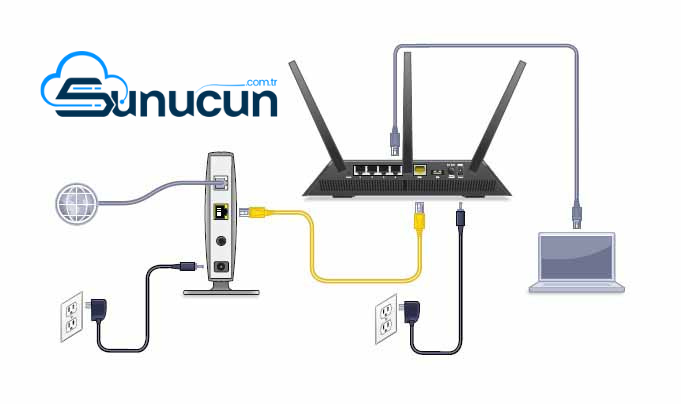What is a Router? What Does a Router Do?
In the modern digital world, we use various network devices to ensure our internet connections are organized and reliable. One such device is the “router.” So, what is a router and what does it do? In this article, we will comprehensively explore what a router is, how it works, its advantages, and what to consider when choosing a router.
What is a Router?
A router is a network device that directs data traffic between networks and shares internet connections. Routers, commonly used in home and office networks, allow different devices to use the same internet connection. A router directs data packets across a network and ensures these packets reach their correct destination. It also offers various security features to control and manage network traffic.
Routers generally perform two main functions:
- Directing Data Packets: The router directs data packets across the network to their correct destinations. This is necessary for accessing websites, sending emails, and other network services.
- Sharing Internet Connections: Routers are used to share a single internet connection among multiple devices. For example, a router may be needed for computers, phones, and tablets in a home to use the same internet connection.

How Does a Router Work?
The operation of a router is based on directing and transmitting data packets between networks. Here are the basic steps showing how a router works:
- Receiving Data Packets: The router receives data packets from the network it is connected to. These packets are then directed towards their destination devices.
- Analyzing Address Information: The router examines the header information of the data packets to determine where they should be directed. This information includes the destination IP address and other routing details.
- Making Routing Decisions: The router makes appropriate routing decisions to ensure the packets reach their destination. This involves selecting the best path across the network.
- Sending Data Packets: The router forwards the data packets to the specified destination. This can be to other network devices on the internet or to the internet service provider (ISP).
Advantages of Using a Router
Using a router offers several advantages:
- Sharing Internet Connections: Using a router to share an internet connection among multiple devices makes internet access easier and more efficient.
- Network Security: Modern routers offer security features, including firewalls, encryption, and network monitoring. These features ensure the security of your network data.
- Load Balancing: Routers balance network traffic to ensure fair internet speed among devices. This is especially important when many devices are using the internet simultaneously.
- Advanced Features: Many modern routers come with advanced features such as Wi-Fi signal boosting, guest network creation, and remote access.
Types of Routers and Selection Criteria
Routers come in various types with different features and functions. Here are some important criteria to consider when selecting a router:
- Wi-Fi Standards: Routers are generally classified according to Wi-Fi standards. Standards like 802.11n, 802.11ac (Wi-Fi 5), and 802.11ax (Wi-Fi 6) offer different speed and performance levels. Wi-Fi 6 is the latest and fastest standard.
- Speed and Performance: The speed and performance of a router affect your internet experience. Routers offering higher speeds and performance provide a better internet experience.
- Coverage: The coverage area of a router determines how far the Wi-Fi signal extends. For larger areas, routers with extended coverage are preferable.
- Security Features: Security features like firewalls, encryption, and other security measures are crucial for protecting your network data. Modern routers usually offer these features.
- Additional Features: Some routers offer extra features, such as USB ports, QoS (Quality of Service) settings, and VPN support. These features can make network management and device connectivity more flexible.
Common Issues and Solutions with Routers
Some common issues you might encounter with routers and their solutions:
- Weak Wi-Fi Signal: A weak Wi-Fi signal can be caused by various factors. Placing the router in a central location and using a signal booster can help resolve this issue.
- Connection Problems: Connection issues can often be resolved by restarting the router or updating its firmware. Checking network cables can also be beneficial.
- Slow Internet Speed: Slow internet speed may be due to an inadequate router or network traffic. Upgrading to a higher-speed router or internet package can solve this problem.
The Importance of Router Security
The security of a router plays a significant role:
- Firewall: Routers typically include a firewall that protects against malicious traffic and attacks.
- Encryption: Connections to the Wi-Fi network are protected by encryption. Standards like WPA2 or WPA3 enhance network security.
- Guest Network: Routers offer the option to create a separate network for guests. This maintains the security of your main network while providing internet access to guests.
Conclusion
A router is an essential network device that ensures the orderly and reliable sharing of internet connections. Routers perform various functions, including directing data packets, sharing internet connections, providing security features, and enhancing network performance. With the right router selection and usage, you can optimize your network performance, increase security, and improve your internet experience. Routers are a crucial part of modern network management and a fundamental component of our digital lives.




